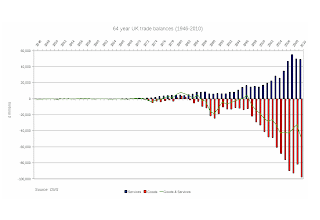Further UK housing market support
The UK housing market is starting to let us peek at its ankles and underskirts. And they are not pretty.
A great deal has probably been happening in the market - which is to say in the businesses of estate agents, lenders, conveyancing firms, housebuilders, & residential property companies on the one hand and households on the other. I say 'probably' for two reasons - first there are figures and observations from the UK housing market that are paradoxical, they don't make sense without something else - some activity in the market which is missing, hidden. Second, because not much information has been forthcoming to explain these paradoxes from industry representatives, relevant government agencies and the financial accounts of participants, including the unpublished and unrecorded 'financial accounts' of households.
Today we had a little drip of information that helps explain why houses are being sold at all. The Telegraph reports that "figures from the Home Builders Federation (HBF) reveal that £835m of shared equity loans were made available between January 2008 and February this year, resulting in 28,000 sales. Under the schemes, housebuilders help customers get together a deposit to buy homes."
This is a significant support to the sale of new homes, and to my way of thinking represents a risky decision by housebuilders. They will lose money on these deals. It is an attempt to 'stimulate' demand by making the home 'affordable', in the short term, relying for its success on nominal house prices rising or remaining stable in say the medium term - short enough for the housebuilder to exit the deal, long enough for house prices to 'recover'.
But if houseprices continue to fall for years, in a secular bear market, as they will, the housebuilders will suffer from capital losses down the road, instead of taking them now. Demand for homes at market prices peaked in 2003, 8 years ago, housebuilders are selling homes into a market that is long-ago saturated by new build, and no-one who is not already a homeowner can afford one.
This might look like fluffy capitalism, with companies 'helping' new homebuyers onto the property ladder, to success and personal fulfillment, but it represents desparate decisions by a number of housebuilders which will cost them dearly in the medium term. If they survive that long.
A great deal has probably been happening in the market - which is to say in the businesses of estate agents, lenders, conveyancing firms, housebuilders, & residential property companies on the one hand and households on the other. I say 'probably' for two reasons - first there are figures and observations from the UK housing market that are paradoxical, they don't make sense without something else - some activity in the market which is missing, hidden. Second, because not much information has been forthcoming to explain these paradoxes from industry representatives, relevant government agencies and the financial accounts of participants, including the unpublished and unrecorded 'financial accounts' of households.
Today we had a little drip of information that helps explain why houses are being sold at all. The Telegraph reports that "figures from the Home Builders Federation (HBF) reveal that £835m of shared equity loans were made available between January 2008 and February this year, resulting in 28,000 sales. Under the schemes, housebuilders help customers get together a deposit to buy homes."
This is a significant support to the sale of new homes, and to my way of thinking represents a risky decision by housebuilders. They will lose money on these deals. It is an attempt to 'stimulate' demand by making the home 'affordable', in the short term, relying for its success on nominal house prices rising or remaining stable in say the medium term - short enough for the housebuilder to exit the deal, long enough for house prices to 'recover'.
But if houseprices continue to fall for years, in a secular bear market, as they will, the housebuilders will suffer from capital losses down the road, instead of taking them now. Demand for homes at market prices peaked in 2003, 8 years ago, housebuilders are selling homes into a market that is long-ago saturated by new build, and no-one who is not already a homeowner can afford one.
This might look like fluffy capitalism, with companies 'helping' new homebuyers onto the property ladder, to success and personal fulfillment, but it represents desparate decisions by a number of housebuilders which will cost them dearly in the medium term. If they survive that long.


Comments
Post a Comment